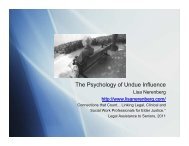Undue Influence: Definitions and Applications - California Courts ...
Undue Influence: Definitions and Applications - California Courts ...
Undue Influence: Definitions and Applications - California Courts ...
Create successful ePaper yourself
Turn your PDF publications into a flip-book with our unique Google optimized e-Paper software.
APPENDIX C<br />
Literature Review on <strong>Undue</strong> <strong>Influence</strong><br />
Lisa Nerenberg<br />
Since the mid-1990s, interest in the role of undue influence in elder financial abuse has<br />
grown. This can perhaps be accounted for by the fact that undue influence offers a compelling<br />
explanation for situations that are increasingly coming to the attention of adult protective service<br />
workers, law enforcement, <strong>and</strong> others in the field of abuse prevention. These include incidents in<br />
which elders who appear to be acting freely (those with minimal or no cognitive impairment <strong>and</strong><br />
who are not being overtly coerced) consent to exploitative transactions, remain in abusive<br />
relationships, <strong>and</strong> defend those who seek to harm or exploit them. In many cases, victims have<br />
strong emotional attachments to their abusers. Some refuse to believe that abuse has occurred<br />
even in the face of significant losses, impoverishment, or homelessness. Some even defend their<br />
abusers.<br />
Practitioners in the field of elder abuse prevention recognize that elders with cognitive<br />
impairments are often tricked, misled, or intimidated into surrendering money or property by<br />
signing documents like powers of attorney, deeds, or other contracts; <strong>and</strong>, that under these<br />
circumstances, victims are not acting “freely.” They further recognize that abusers may gain<br />
compliance through threats <strong>and</strong> coercion. But cognitive impairment <strong>and</strong> coercion do not explain<br />
those situations in which victims appear to be acting freely.<br />
Most practitioners in the field of elder abuse prevention, including social workers, adult<br />
protective service workers, <strong>and</strong> legal <strong>and</strong> health care professionals, adhere to ethical <strong>and</strong> practice<br />
principles or guidelines that acknowledge clients’ autonomy <strong>and</strong> right to make their own<br />
decisions. This extends to actions or choices that appear eccentric, risky, or even foolish. As a<br />
result, they have been reluctant to call seemingly counterproductive actions into question for fear<br />
of treading on clients’ civil liberties. But as awareness of abuse increases <strong>and</strong> more of these<br />
70




